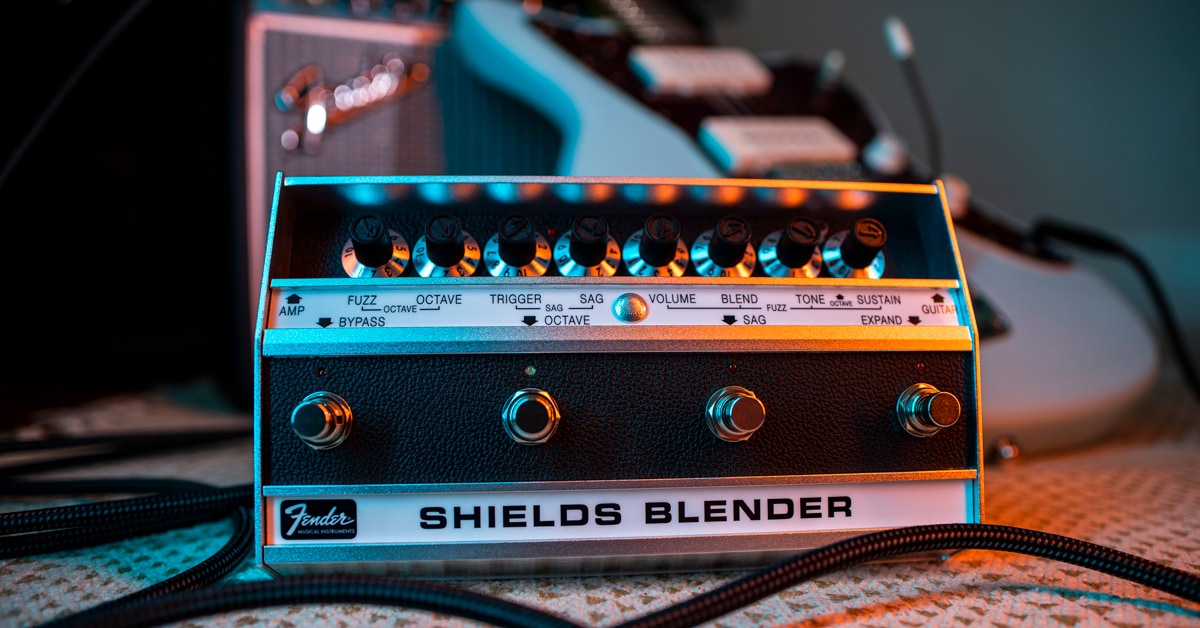Fuzz—from smooth to splatter, where would the contemporary guitarist be without it? Whether mild or wild, it's been one of the defining tones in pop and rock ever since 1960, when Nashville session great, Grady Martin, unknowingly played through a broken input channel on Marty Robbins' 1960 hit, “Don't Worry.” In this article, we're going to take a look at a selection of fantastic fuzz pedals you can buy from Guitar Center today.
Table of Contents
Comparing the Top Fuzz Pedals
The Best Fuzz Pedals of 2025
Animals Pedal Sunday Afternoon Is Infinity Bender
Beetronics FX Royal Jelly
BOSS FZ-1W
Death by Audio Fuzz War
Dunlop JH-F1 Jimi Hendrix Fuzz Face
Electro-Harmonix Classics USA Big Muff Pi
Electro-Harmonix Lizard Queen Octave Fuzz
Fender Shields Blender
JHS Muffuletta
MXR Custom Shop Hybrid Fuzz
Wren and Cuff OG Box of War
Put It on the Board
Comparing the Top Fuzz Pedals
|
Pedal |
Power |
Power Draw |
Voicings |
Tonal Character |
|
9V battery or power supply |
1mA |
1 |
Silicon version of the classic germanium Tone Bender circuit |
|
|
Power supply only |
60mA |
3 |
Lots of variation on the Tone Bender heritage; smooth to biting |
|
|
9V battery or power supply |
16mA |
2 |
A thoroughly modern fuzz that also makes a nod to vintage heritage |
|
|
9V battery or power supply |
1mA |
Variable |
Capable of extreme fuzz with a wide-ranging tone control |
|
|
9V battery |
0.5mA |
1 |
Classic psychedelic fuzz tones; a true original |
|
|
9V battery or power supply |
3mA |
1 |
Creamy, violin-like sustain to huge fuzz growl |
|
|
9V battery or power supply |
5mA |
3 |
Unique octave fuzz with blend of voices |
|
|
9V battery or power supply |
80mA |
2 |
Reimagined version of vintage octave fuzz with presets |
|
|
Power supply only |
4mA |
6 |
Tone of every Big Muff in one box, plus JHS' take on the circuit |
|
|
9V battery or power supply |
2.5mA |
1 |
Aggressive silicon fuzz with germanium smoothness and splatter |
|
|
9V battery or power supply |
5.5mA |
1 |
The darker ’90s Muff sound, reborn |
The Best Fuzz Pedals of 2025
Animals Pedal Sunday Afternoon Is Infinity Bender
Why It's Cool:
- Classic germanium Tone Bender sound expanded with more stable silicon transistors
- Serious vintage vibe, with some extra attitude.
Things to Consider:
- Ultralow 1mA current draw makes for long battery life or less drain on your power supply
- Works well with both solid-state and tube amps
- True-bypass operation
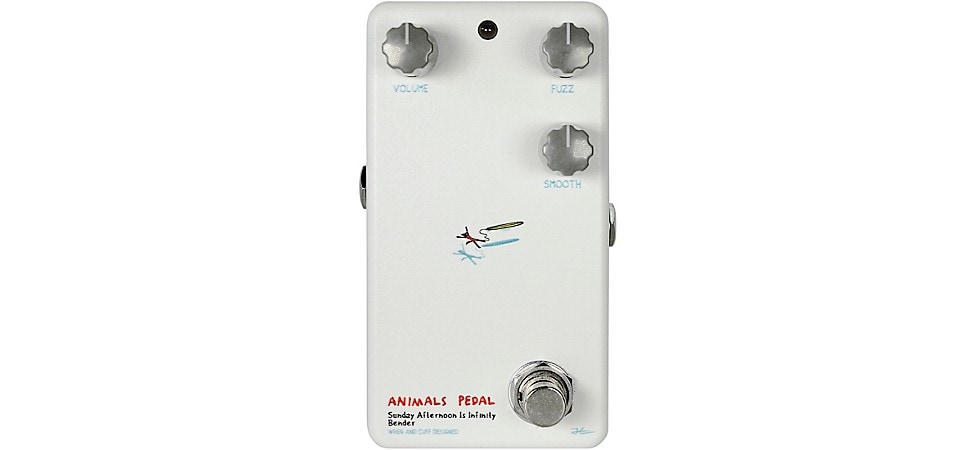
Pictured: Animals Pedal Sunday Afternoon is Infinity Bender Fuzz Pedal
Starting off as a copy of the Maestro FZ-1 Fuzz-Tone pedal, which was most famously used by Keith Richards on "Satisfaction," the Sola Sound (later VOX) Tone Bender was one of the pedals that helped define what fuzz could be. The Sunday Afternoon Is Infinity Bender, designed by Wren and Cuff for Animals Pedal in Japan, carefully redesigns the vintage germanium transistor circuit to use more stable silicon transistors, but without compromising the glorious spatter and growl of the original. This new, true-bypass design also adds some more modern features and adds a "Smooth" knob that easily enables the Sunday Afternoon Is Infinity Bender to play gracefully with a wider range of amplifiers than the original.
If the sound of the Tone Bender gets you all warm and fuzzy, you might want to check our article on the history of the original Tone Bender.
Beetronics FX Royal Jelly
Why It's Cool:
- Combination overdrive and fuzz that enables blending between the two
- Fuzz side based on Sola Sound Tone Bender
- Capable of two blend presets (King and Queen)
Things to Consider:
- 60mA power draw and usable only with a (not included) external power supply
- Parallel signal paths for OD and fuzz effects enable two distinct blend settings
- 2-band EQ for fine tone control
- Double-width pedal will take up more space on your pedalboard (but it does provide two effects, so YMMV)
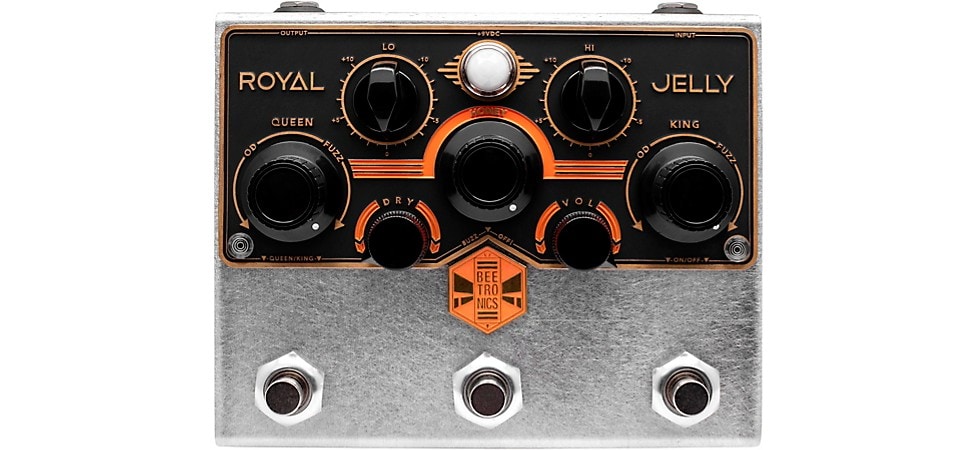
Pictured: Beetronics FX Royal Jelly Fuzz Pedal
Another fuzz based on the Sola Sound Tone Bender, the handwired Beetronics Royal Jelly offers a unique take by providing parallel signal paths for the fuzz and overdrive that can be blended together for two distinct switchable voices. You can also blend in your dry (uneffected) signal for a layering of clean under the gritty fuzz. Another plus is the Buzz switch, which adds some of the high-frequency "sting" that vintage fuzz pedals are known for back into the smoother sound of the Royal Jelly.
BOSS FZ-1W
Why It's Cool:
- Versatility without being a clone
- Classic BOSS compact pedal design
- Channels a rich history of fuzz and distortion capable of running the gamut from vintage clipping to modern fuzz sounds
Things to Consider:
- 16mA current draw means decent battery life if you're going without an external power supply
- Tight mid-range focus in modern voicing
- If you're using other BOSS pedals, keeps a unified look to your pedalboard
- The Waza Craft concept means excellent design and build quality
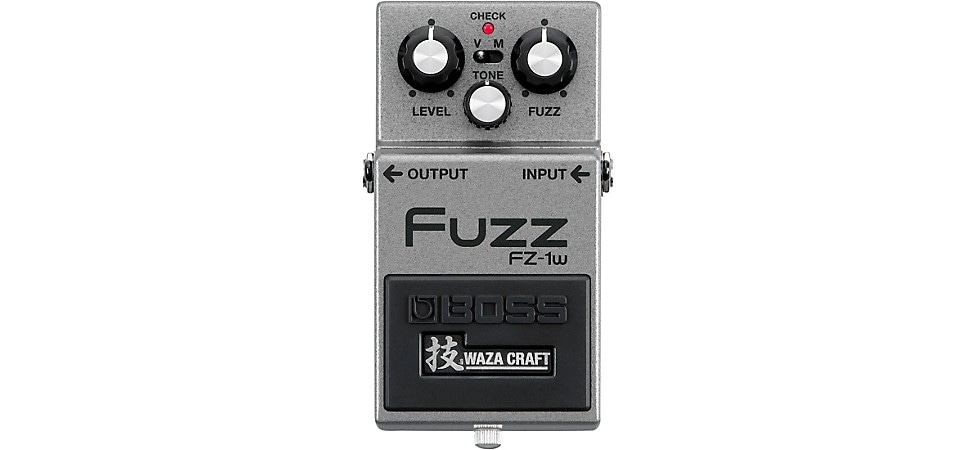
Pictured: BOSS FZ-1W Waza Craft Fuzz Pedal
While, in many ways, inspired by the Tone Bender—a modified take on the first commercial fuzz box, the Maestro FZ-1—the BOSS FZ-1W is less a clone and more a unique circuit that pays tribute to the tonal character of those early fuzzes. But don't be fooled by that, as the FZ-1W has plenty of its own personality that can readily take if from vintage, bee-buzzy tones to a tighter, more aggressive modern fuzz.
Death By Audio Fuzz War
Why It's Cool:
- Exceptionally wide range of gain, fuzz and tone
- Internal trimpot lets you adjust gain to your personal playing style
- Covers from boost to extreme fuzz
Things to Consider:
- Ultralow 1mA current draw for long (~300-hour) battery life
- Versatile enough to use with bass as well as guitar
- Wide range of controls can make duplicating a tone you like a little finicky
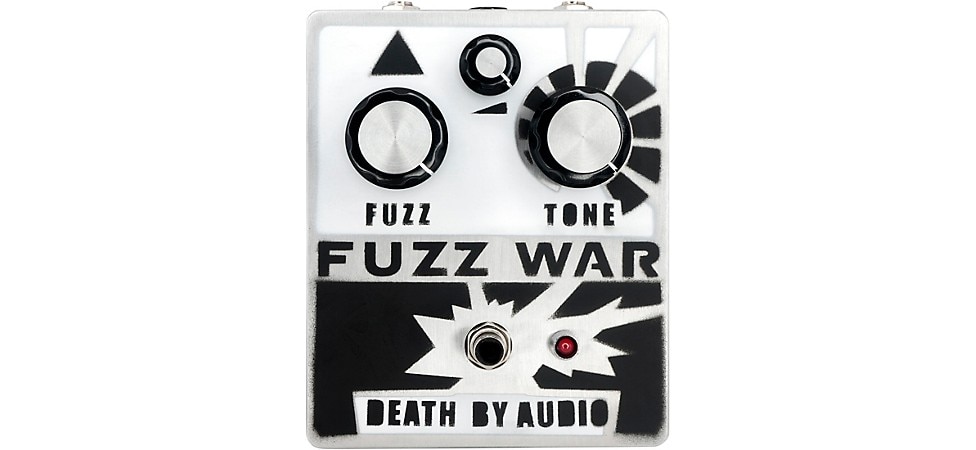
Pictured: Death by Audio Fuzz War Fuzz Pedal
Possibly the most extreme fuzz in this list—the Death by Audio Fuzz War definitely has the most extreme range of available tones. While not a clone or even an "inspired by" type of design, it obviously has sonic roots in vintage units like the Big Muff and Fuzz Face. An internal trimpot allows you to customize the basic gain structure, which can help either reduce or max out the sonic chaos factor, tuning it in to your personal playing style.
Dunlop JH-F1 Jimi Hendrix Fuzz Face
Why It's Cool:
- Vintage vibe galore
- Extremely accurate recreation of a classic
- Very interactive with guitar volume knob and playing dynamics
Things to Consider:
- 9V battery only, but the extremely low, 0.5mA current draw provides exceptional battery life, as long as you remember to unplug the input when you're not using it
- For best effect, you need to run this first in your signal chain, without a buffer in front of it, as it is, like the original, very sensitive to your guitar's volume settings and your playing dynamics
- The circular shape needs to be accounted for in pedalboard layout. Looks exceptionally cool, though
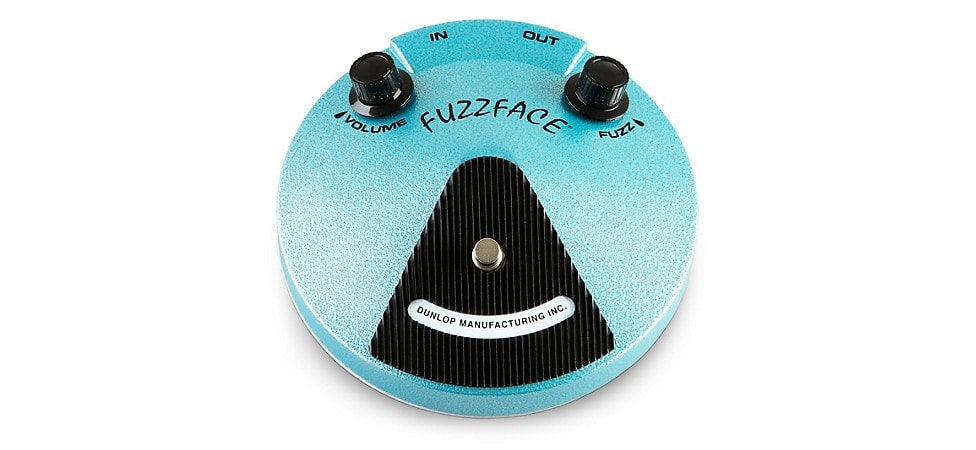
Pictured: Dunlop JH-F1 Jimi Hendrix Fuzz Face Pedal
The Dunlop JH-F1 Jimi Hendrix Fuzz Face is a lovingly accurate recreation of one of the most legendary fuzz pedals of all time, as used in Hendrix’ iconic signal chain, plugged into a Octavia, Uni-Vibe and Marshall stack. Based on analysis of the best of a number of classic original Arbiter Fuzz Face pedals, this hardwired fuzz is about as simple as you can get, with only two knobs—Volume and Fuzz—that's it. Like the original, it is extremely interactive with your playing dynamics and your guitar's volume knob in a completely organic way. If early psychedelia is your jam, this is the pedal. You can dig into Dunlop's full assortment in our Fuzz Face buying guide.
Electro-Harmonix Classics USA Big Muff Pi
Why It's Cool:
- Classic tone that takes you from the ’60s to the present
Things to Consider:
- Low, 3mA current draw
- True-bypass design
- Interactive with dynamics and guitar volume knob, so avoid buffers for full range
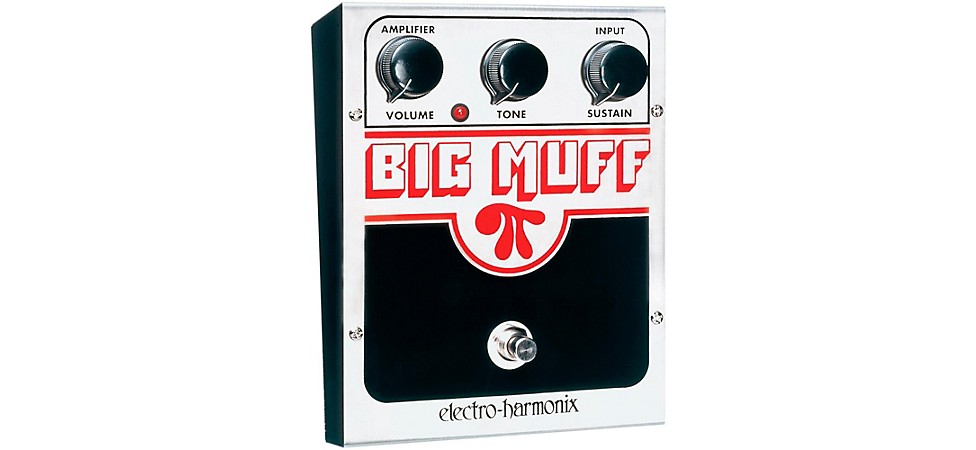
Pictured: Electro-Harmonix Classics USA Big Muff Pi Fuzz Pedal
Before Electro-Harmonix existed, Mike Matthews was making fuzz boxes for Guild (the Foxey Lady), out of which grew the Big Muff Pi. The Electro-Harmonix Classics USA Big Muff Pi harkens back to the original three-knob Big Muff, with a rich, creamy sound that can be smooth or aggressive, depending on your fuzz and tone settings. This one has been a favorite of many players over the years, from David Gilmour to Billy Corgan and J Mascis. If your pedalboard is getting a little crowded, you might want to check out the Nano and Little Big Muff Pi models. And, if you want the full story, check out our dedicated history of the Big Muff.
Electro-Harmonix Lizard Queen Octave Fuzz
Why It's Cool:
- Vintage octave fuzz vibe from an all-star collaboration
- Unique voicing, unlike any other octave fuzz
Things to Consider:
- 5mA current draw for good battery life
- Balance knob can take a little getting used to, and needs some time to grasp —not quite a gain control and not quite a tone control, it affects both
- Like most fuzz pedals, keep this one early in your signal chain
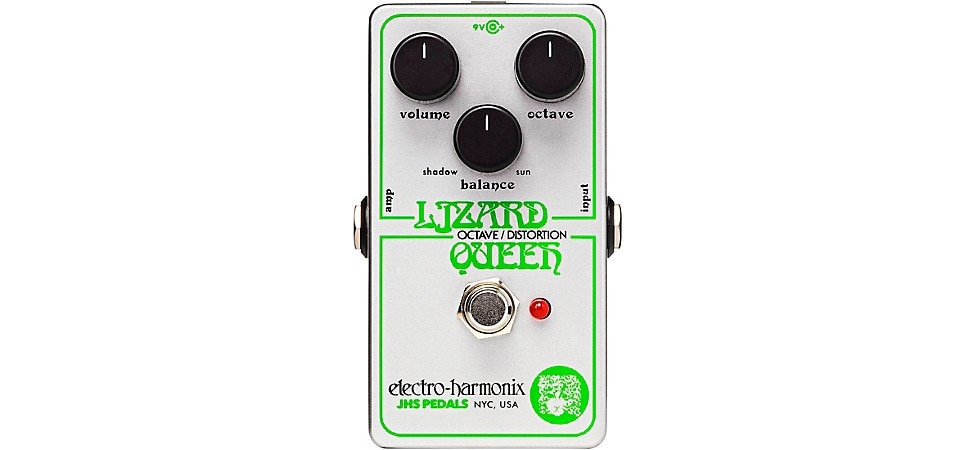
Pictured: Electro-Harmonix Lizard Queen Octave Fuzz Pedal
What if Electro-Harmonix had created an octave fuzz in the early 1970s? That was the question that Josh Scott of JHS Pedals and Daniel Danger of EHX were determined to answer, and the Lizard Queen, that started out as a one-off fantasy build, became real. It's not a vintage design, strictly, but it's got that filthy, gritty vibe, and the octave tone is rich and usable. Not an always-on pedal, unless you're deeply weird, but definitely one to have for those moments when nothing else will do.
Fender Shields Blender
Why It's Cool:
- Updated and expanded version of classic Fender octave fuzz
- Multiple voices make it very versatile
- Extremely expressive
Things to Consider:
- 80mA current draw means short battery life. Optional power supply highly recommended
- Very reactive to playing dynamics
- True-bypass design with two available preset voicings
- It's huge, roughly the size of three to four standard pedals
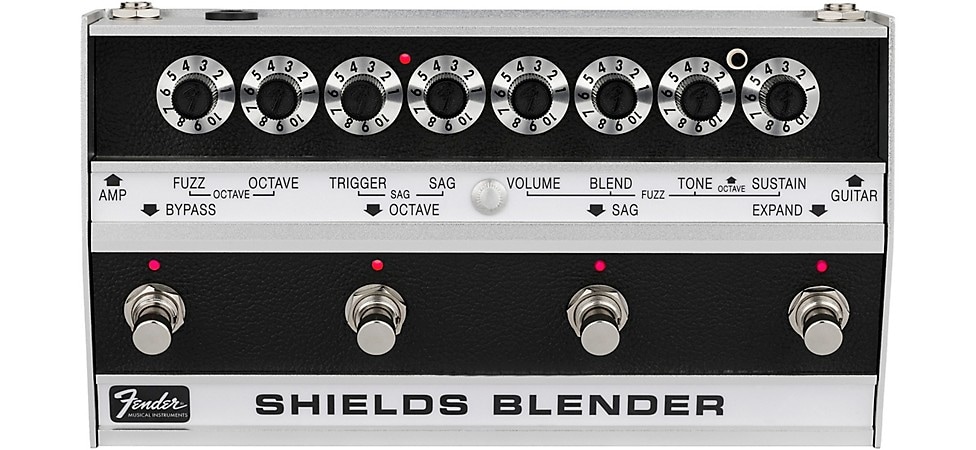
Pictured: Fender Shields Blender Fuzz Pedal
Part of Kevin Shields’ sonic signature with My Bloody Valentine was always his vintage Fender Blender octave fuzz. Shields and Fender collaborated on this updated design that nails the vintage sound while adding some very modern touches. With two available presets, the ability to blend fuzz, sub-octave and clean tones along with a unique sag control that varies the fuzz depending on your attack, the Fender Shields Blender offers extreme versatility in tonal mayhem.
JHS Muffuletta
Why It's Cool:
- Every version of the classic Big Muff Pi in one box
Things to Consider:
- Low 4mA current draw
- Six different fuzz voicings, from vintage to modern, in one box
- Standard size pedal with maximum versatility
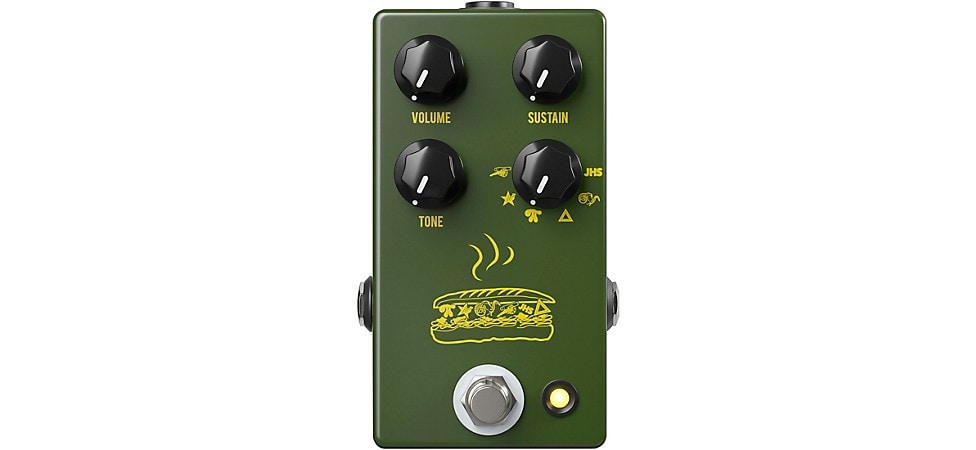
Pictured: JHS Muffuletta Fuzz Pedal
Two things we love about JHS Pedals' Josh Smith are his love of classic effects pedals and his obsessive attention to detail. In the Muffuletta, JHS has packed five different variations of the iconic Big Muff fuzz, plus his personal take on the circuit into one screaming pedal. You get everything from the earliest iteration, late ’60s "triangle knob" Big Muff, through the classics of the ’70s, ’80s, ’90s and early 2000s. For those with only room for a single fuzz on their pedalboard, this may be the answer.
MXR Custom Shop Hybrid Fuzz
Why It's Cool:
- Combination of two classic Fuzz Face circuits in one for a unique, yet familiar fuzz
- Very responsive to touch and guitar volume
Things to Consider:
- Low 2.5mA current draw
- Hybrid circuit creates a unique fuzz tone that combines aggressive bite with just the right amount of germanium splatter
- Avoid a buffer in front of this one to maintain touch/volume sensitivity

Pictured: MXR Custom Shop Hybrid Fuzz Pedal
Leave it to the MXR Custom Shop to take an icon and make it more interesting. Their Hybrid Fuzz pedal takes the best of the very early germanium-based Arbiter Fuzz Face and the later silicon-based version to create a sound that's unique, but still familiar. You get the raw aggression of the silicon circuit tempered with a bit of the smoother sound of the germanium version. Plus, the pedal graphics are a cool psychedelic addition to your pedalboard.
Wren and Cuff OG Box of War
Why It's Cool:
- Classic ’90s fuzz sound lovingly and accurately re-created
Things to Consider:
- Reasonably low 5.5mA current draw for 30–40 hour battery life
- True-bypass circuit
- Very heavy-duty box
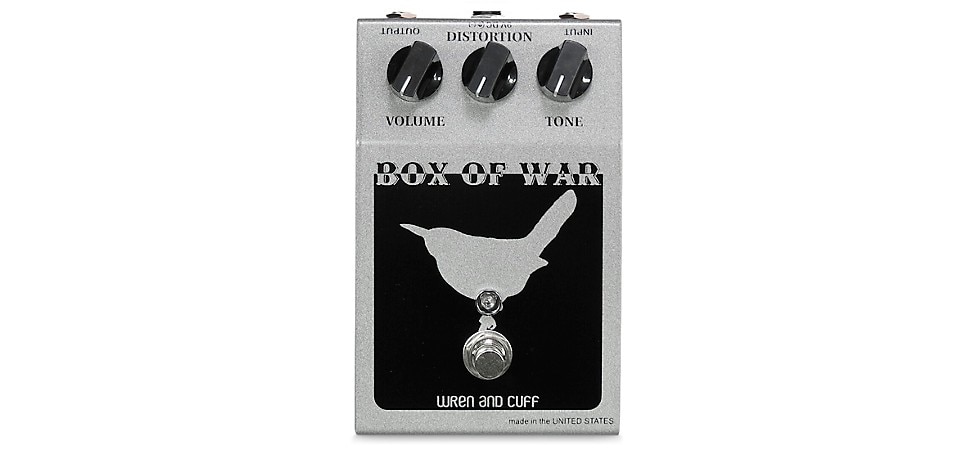
Pictured: Wren and Cuff OG Box of War Fuzz Pedal
Wren and Cuff take pride in their painstaking research and accurate reproduction of classic circuits, and their OG Box of War fuzz, a recreation of the ‘90s-era "Civil War" Big Muff fuzz, shows it in spades. The original was a weapon of choice for many grunge and alt-rock players, and this fuzz pedal captures that sound perfectly. Its darker sonic nature is perfectly suited to a moodier vibe and menacing attitude.
Put It on the Board
There you have it—eleven fuzzes, from vintage inspired to new circuits, all waiting for you to crank it up. We know it can be a difficult choice, and that's why your local Guitar Center store has a massive selection of pedals, with an interactive pedal table at select locations, where you can plug in and play, and make that decision with your own ears. Plus, our knowledgeable associates can answer any questions you might have and help you kit out a personalized pedalboard. Or, if you don't have a local store, the Gear Advisers at our Call Center can provide the information you need to make sure that when you rock out, you've got the right gear.




